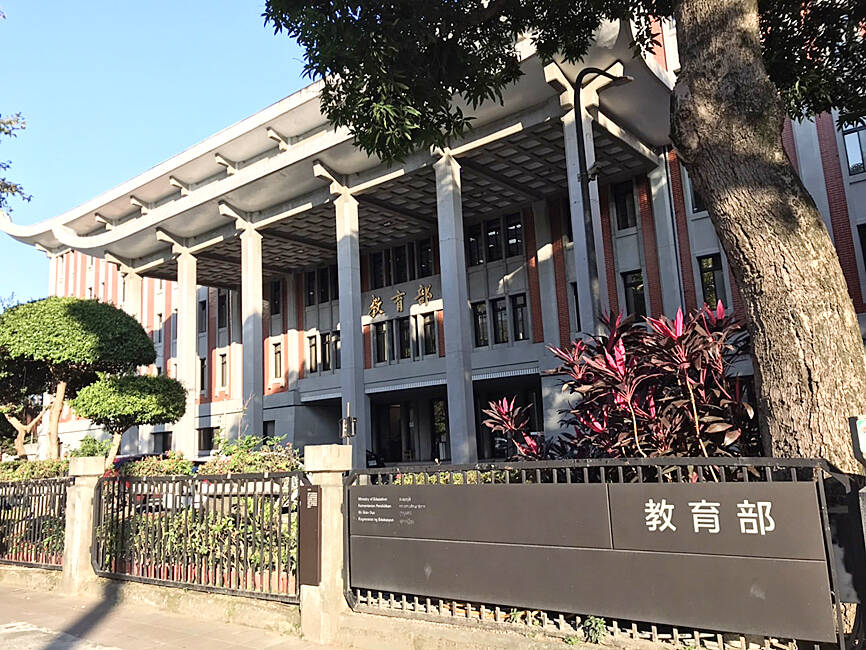The Corpus of Taiwanese Hoklo established by the National Academy for Educational Research has been launched online, with more than 56,000 searchable entries, the Ministry of Education said.
The ministry last year commissioned the academy to compile the collective knowledge of Hoklo (commonly known as Taiwanese) and build a retrieval system, enabling searches among more than 56,000 entries and approximately 1,400 words designated for Hoklo-language textbooks.
The system has three subsystems — linguistic material, textbook words and grammar, the ministry said, adding that it is a resource for curriculum design, proficiency assessments and linguistic research.

Photo: Yang Mien-chieh, Taipei Times
Teachers can consult the system to find words and information from Hoklo-language textbooks, as well as collocations — words or terms that are together more often than would be expected by chance — correlatives and audio of retrievable words to enrich their course content, while using the system’s descriptions and example sentences to help students learn better, it said.
An additional corpus of more than 26,000 Hoklo sentences, along with audio files, and artificial intelligence (AI) tools and models, is also available via an app, the ministry said, adding that it can be used as the cornerstone of AI development in speech processing and computer-assisted instruction.
Department of Lifelong Education official Chi Hsien-yang (紀咸仰) said that the retrieval system also has example sentences from the official Hoklo dictionary approved by the ministry, as well as the Mandarin-Hoklo Bilingual Dictionary (華台對照詞典) compiled by Lu Kuang-cheng (盧廣誠).
For example, querying the system for “sleepy,” which is denoted as “khun” (睏) in Hoklo, would yield the correlative entries of “hioh-khun” (歇睏, “rest”) and “hioh-khun-jit” (歇睏日, “rest day”), with links to the ministry’s Hoklo Idioms Dictionary (教育部台灣台語常用詞辭典) for further information, Lu said.
Some entries have audio files of example sentences to enhance systematic learning of Hoklo, Chi said.
Deputy Minister of Education Yeh Ping-cheng (葉丙成) on Monday wrote on Facebook that the launch of the system marked a milestone in the ministry’s history, with the content open to teachers and entrepreneurs to bolster the education sector and innovate digital learning products.
About a decade ago, the ministry granted lots of resources to universities to develop digital education resources, but most of them were rarely visited, as the universities were not adept at promoting the content, Yeh said.
Making the ministry’s resources, including the Hoklo corpus, public would facilitate teaching and software innovations, while also nurturing more research and development that could lead to a local education industry ecosystem in Taiwan, he said.
“The ministry would continue to compile digital content that were rarely visited and used, and allow people to tap into the resources via apps, expecting the new method to help build a prosperous ecosystem of the education industry in Taiwan,” he said.

A magnitude 7.0 earthquake struck off Yilan at 11:05pm yesterday, the Central Weather Administration (CWA) said. The epicenter was located at sea, about 32.3km east of Yilan County Hall, at a depth of 72.8km, CWA data showed There were no immediate reports of damage. The intensity of the quake, which gauges the actual effect of a seismic event, measured 4 in Yilan County area on Taiwan’s seven-tier intensity scale, the data showed. It measured 4 in other parts of eastern, northern and central Taiwan as well as Tainan, and 3 in Kaohsiung and Pingtung County, and 2 in Lienchiang and Penghu counties and 1

FOREIGN INTERFERENCE: Beijing would likely intensify public opinion warfare in next year’s local elections to prevent Lai from getting re-elected, the ‘Yomiuri Shimbun’ said Internal documents from a Chinese artificial intelligence (AI) company indicated that China has been using the technology to intervene in foreign elections, including propaganda targeting Taiwan’s local elections next year and presidential elections in 2028, a Japanese newspaper reported yesterday. The Institute of National Security of Vanderbilt University obtained nearly 400 pages of documents from GoLaxy, a company with ties to the Chinese government, and found evidence that it had apparently deployed sophisticated, AI-driven propaganda campaigns in Hong Kong and Taiwan to shape public opinion, the Yomiuri Shimbun reported. GoLaxy provides insights, situation analysis and public opinion-shaping technology by conducting network surveillance

‘POLITICAL GAME’: DPP lawmakers said the motion would not meet the legislative threshold needed, and accused the KMT and the TPP of trivializing the Constitution The Legislative Yuan yesterday approved a motion to initiate impeachment proceedings against President William Lai (賴清德), saying he had undermined Taiwan’s constitutional order and democracy. The motion was approved 61-50 by lawmakers from the main opposition Chinese Nationalist Party (KMT) and the smaller Taiwan People’s Party (TPP), who together hold a legislative majority. Under the motion, a roll call vote for impeachment would be held on May 19 next year, after various hearings are held and Lai is given the chance to defend himself. The move came after Lai on Monday last week did not promulgate an amendment passed by the legislature that

AFTERMATH: The Taipei City Government said it received 39 minor incident reports including gas leaks, water leaks and outages, and a damaged traffic signal A magnitude 7.0 earthquake struck off Taiwan’s northeastern coast late on Saturday, producing only two major aftershocks as of yesterday noon, the Central Weather Administration (CWA) said. The limited aftershocks contrast with last year’s major earthquake in Hualien County, as Saturday’s earthquake occurred at a greater depth in a subduction zone. Saturday’s earthquake struck at 11:05pm, with its hypocenter about 32.3km east of Yilan County Hall, at a depth of 72.8km. Shaking was felt in 17 administrative regions north of Tainan and in eastern Taiwan, reaching intensity level 4 on Taiwan’s seven-tier seismic scale, the CWA said. In Hualien, the